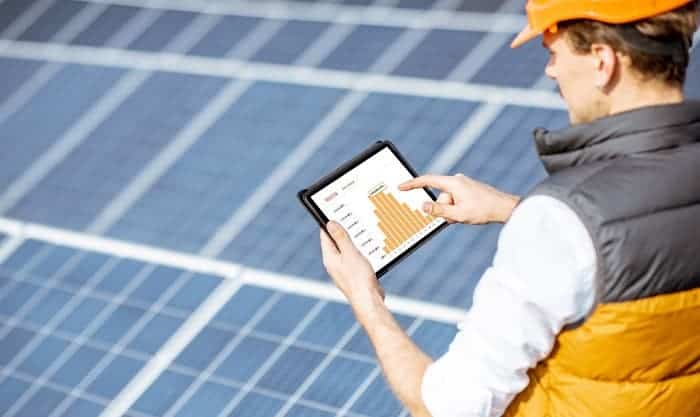How much do solar panels save? The answer to this question primarily depends on several factors, such as local electricity rates, your power consumption, direct hours of sunlight, and the size of your solar system.
The delightful news is that residential solar panels don’t merely help you save more money on utility bills, but they also aid in minimizing your carbon footprint. Solar panels initially cost more; nonetheless, they will offer you more rewards over time.
The average household could save roughly $10,000 up to $30,000 over the lifespan of a solar system. In this post, let’s unveil the financial benefits of going solar.
Table of Contents
Do Solar Panels Save Money
Definitely, yes! As mentioned, the amount of money you can save by going solar relies on many factors. The angle and size of your roof, as well as the direct hours of daily sunlight in your area, are crucial factors to consider. Nevertheless, local electricity rates certainly play a vital role in pointing out how much solar systems can save you.
With countless investment opportunities available at present, it’s sometimes confusing to decide on various products that claim to have the capability to help you save more bucks. Indeed, solar systems are no different — saving bucks through significantly minimizing your energy costs is one of the most luring selling points.
The initial phase to understand how much solar panel savings you can obtain is to compute how much energy you’re consuming each year. For instance, the average yearly electricity consumption needed for a US household is roughly 10,649 kWh.
Multiply this by the national average energy rate of $0.1360 per kWh – this is as of October 2020. From there, you’ll unveil that the usual American family is spending around $1,450 annually, and this is sadly for electricity alone.
It’s also necessary to look into the changeable nature of energy costs and determine the utility rates in forthcoming years. When you correlate the cost of utility energy with home solar, anticipate energy rates to escalate yearly.
Over the years, national energy costs have escalated at a rate of approximately 2.2 percent per year. The utility rate hike is an extra incentive for solar energy usage. When you produce your own electricity with a rooftop photovoltaic system, you can keep the electricity cost at a steady rate. This way, it’s unnecessary to deal with fluctuating utility rates.
The only cost linked with going solar is the installation cost and any extra energy expenses if your solar panels don’t fully provide 100 percent of your energy usage.
Whether or not your solar system would fully meet your energy requirements is mainly dependent on how precisely you size your PV system. For this, you could compute the number of panels you’ll require to secure that percentage.
So, how much money do solar panel systems save you on electric usage?
You can use these suggestions to calculate your savings (adjust solar system size and energy consumption as necessary):
- 6 kilowatts is your solar panel system’s size
- Your consumption is 10,649 kWh each year
- 2.2 percent is the utility rate inflation
- 96% – the percentage requirements met by your solar panel systems
- Your electricity rate will be based on your state’s average
Solar Energy Savings
In any case, whether you are looking at your carbon emissions or finances, going solar will certainly produce remarkable savings for your household. 20-year energy savings from installing a solar system could be notable, ranging from $10,000 to nearly $30,000.
Fundamentally, the deciding factor would mainly be the energy cost, which could vary tremendously depending on your location. Regardless, solar power would surely be a safe investment with significant returns if you reside in a location with middle to upper-level utility rates.
As for carbon emissions, as your solar panel system size escalates, so do the decline in carbon dioxide in our surrounding. Thus, going solar is an eco-friendly decision and investment.
Meanwhile, you may consider using a solar calculator if you’re searching for customized estimates not solely around your possible savings from solar energy but also the expense of a solar system.
This video is worth watching and exploring for more detailed info on how solar panels save you money:
Solar Panels Save on Electricity Bills
Do I still have an electricity bill to deal with when I have solar panels installed? The answer to this question is yes! Even though you set up sufficient solar energy to fully compensate for your energy consumption, you’ll still receive an electricity bill from your utility so long as your house remains connected to the grid.
But, the good news is that this does not necessarily mean that you’ll frequently pay on your bill. In most states, there is a policy known as “net metering.” This policy asserts that the energy your panels generate that you don’t utilize is transmitted to the grid in exchange for credits on your energy bill.
Hence, this enables you to collect energy from the grid at dusk; however, you won’t need to pay additional money so long as you use the same amount or less than what you supplied to the grid.
When you get your monthly energy bill, any net metering credits you utilized for that month would be specified, and you won’t have to pay for that energy. The remaining energy you draw from the grid that wasn’t compensated by net metering credits is where you’ll see minimal charges for energy.
Ultimately, you would still receive an energy bill when you set up solar panels. The bill won’t necessarily ask you to pay anything; instead, it might only specify how net metering credits compensate for your consumption for a month.
In conditions where you supply more energy to the grid than you draw, your utility would typically add your unutilized bill credits to the next month. As a result, you can significantly benefit from that.
Overall, you can take advantage of substantial solar panels save per month. It might exclude your monthly energy bill in some circumstances.
The Environmental Benefits of Installing Solar Panels
Apart from the considerable savings that you could earn by installing solar panel systems at home, going solar can also provide several environmental benefits.
Isn’t it good to know that installing solar systems will help you save tons on your finances and help save our planet?
Let’s check out the environmental benefits you can take advantage of once you install solar panel systems at home or in the workplace:
Renewable
Solar power is undoubtedly a form of renewable energy, which means that so long as the sun is around, we can enjoy an endless supply of solar energy.
At present, fossil fuels are what we utilize the most; unfortunately, they are non-renewable sources of energy.
The sad news is that fossil fuels are close to running out, and utilizing them more often brings about immense damage to our environment.
Cuts Grid Energy Use
There’s no denying that utilizing solar panel systems can remarkably lessen the amount of electricity you consume from the grid. You could even utilize solar-powered batteries to keep your home powered every night.
With this, you could save more energy and minimize the number of pollutants being released each day.
No Maximum Maintenance Required
When your gas boilers get damaged and other kinds of traditional heating crash, you usually get them replaced, or they call for serious repairs. These could contribute to the toxic emissions that we generate daily, which are hazardous to our planet.
The solar panel’s manufacturing process might not be ideal since there is a little toxic waste. However, the fact that solar panels don’t require complete maintenance implies that they support “green” operation.
Zero Emissions
Solar power depends mainly on absorbing sunlight and transforming that energy into electricity or heating your home. This implies that you’re not generating any toxic emissions and greenhouse gases contributing to global warming.
Installing solar panel systems can lessen your carbon footprint by approximately 80 percent in a year.
The Bottom Line
Overall, solar panels have often been an excellent alternative when it comes to significant potential electricity savings.
Be that as it may, it’s crucial to understand that the amount of money you could save will vary depending on many factors.
As discussed, the factors that could somehow affect the amount of money you could set aside by going solar are as follows:
- the size of your solar panel system
- direct hours of sunlight and your power consumption
- local electricity rates
How much do solar panels save? Again, you need to compute how much you’re spending on energy each year.

I am Kathleen Miller, staff writer and reviewer of the Avasolar team. Working with the team has been a pleasure for me so far, I hope to bring readers useful information by creating detailed and easy-to-follow contents.


